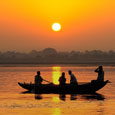Diwali Traditions
Diwali, a diminutive form of Deepavali, etymologically
means a row of lights ('Deep'- light and 'Avali'-a row). Hence it is festival
of lights. Marked mainly by four days of celebration it certainly illumines
the country in its brilliance and brightens all with its joy. Diwali is
a pan-Indian festival. It is celebrated on a grand scale in almost all
the regions of India and is looked upon mainly as the beginning of New
Year. As such the blessings of Lakshmi, the celestial consort of Lord
Vishnu, are invoked with prayers. Even people of Indian origin in countries
like Kenya, Thailand, Trinidad, Siam, Sri Lanka and Malaya celebrate this
festival but in their own ways.
Diwali is a time to lit up 'diyas' in and around the house, and
kindle the dark, moonless night-sky with dazzling display of fireworks. It is
a time for rejoice, time to go berserk. It is also a time to put on new things,
time for exchanging gifts and greetings and wishing each other. It is time for
the children to seek the blessings of the elderly and for the elderly to bless
the children profusely.
Diwali is also time of transition from darkness
unto light - the light that empowers us to commit ourselves to good deeds and
which brings us closer to divinity. And hence it is time to keep at bay all parochial
interests and fling open all the doors of our mind so that it is a-washed thoroughly
by the lights of joy and righteousness.
In each of the simple traditions and rituals at Diwali
there is a tale of significance and credo. Apart from the celebration of Rama's
return to Ayodhya, historically too, the origin of Diwali can be traced back to
ancient India, when it was probably an important harvest festival.
Diwali
that is the 15th day of the month of Kartik is a holiday and is celebrated with
fervor and gaiety. Being a New Year day all financial transactions remain closed
on this day. Lord Ganesh, the elephant-headed god, the symbol of auspiciousness
and wisdom, is also worshipped in most Hindu homes on this day.
In North
India on the day of the Diwali the children emerge, scrubbed clean to get into
their festive attire, and light up little oil lamps, candles and agarbathis the
wherewithal for setting alight crackers and sparklers.
On this day there
is a traditional practice, specially in Maharashtra, of taking bath before sunrise
with oil and "Uptan" (paste) of gram flour and fragrant powders.
In South India the day is celebrated in a unique way. People wake up before
sunrise prepare blood by mixing Kumkum in oil and after breaking a bitter fruit
that represents the head of the demon King that was smashed by Krishna, apply
that mixture on their foreheads. Then they have an oil bath using sandalwood paste.
The illumination of homes with lights and the skies with firecrackers
is an expression of obeisance to the heavenly for the attainment of health, wealth,
knowledge, peace and fame. According to one belief, the sound of fire-crackers
are an indication of the joy of the people living on earth, making the gods aware
of their plentiful state. Still another possible reason has a more scientific
basis: the fumes produced by the crackers kill a lot of insects, found in plenty
after the rains.
The tradition of gambling on Diwali also has a legend behind
it. It is believed that on this day, Goddess Parvati played dice with her husband
Lord Shiva and she decreed that whosoever gambled on Diwali night would prosper
throughout the ensuing year.
Other
Traditions:
Apart from the epical attributions Diwali is regarded
as a pious day for other reasons as well.
To the Jain's, Deepavali has an
added significance to the great event of Mahaveera attaining the Eternal Bliss
of Nirvaana.
It is on the same day of Amavasya Swami Dayananda Saraswati,
that leonine sanyasin who was one of the first to light the torch of Hindu Renaissance
during the last century, passed into Eternity.
Swami Ramatirtha who carried
the fragrance of the spiritual message of Hindu Dharma to the western world, also
passed into eternity. The lights kindled on this day also mark the attempt of
their followers to immortalize the sacred memories of those great men who lived
to brighten the lives of millions of their fellow beings. The passage of these
great men have indeed brought the national-cum-spiritual tradition of Deepavali
right up to modern times.

 Friendship Day
Friendship Day Good Morning
Good Morning